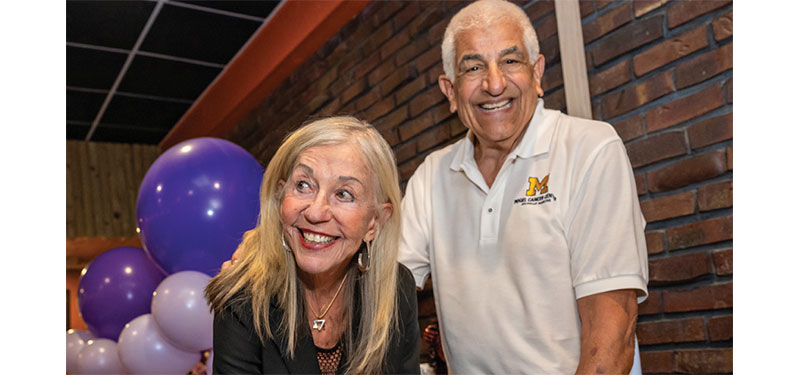Rogel Cancer Center receives $50M to revolutionize pancreatic cancer care and research
contributed by Nicole Fawcett | Media contact: Anna Megdell, 734-764-2220 | Patients may contact Cancer AnswerLine™ 800-865-1125

Photo: Michigan Medicine
With a $50 million gift from Richard and Susan Rogel, the University of Michigan Health Rogel Cancer Center aims to revolutionize how the world detects, treats, and ultimately cures pancreatic cancer.
The gift will create the Rogel and Blondy Center for Pancreatic Cancer in honor of Max Rogel and Allen Blondy, Richard and Susan Rogel’s fathers, both of whom died from cancer.
It will provide support for clinical care and translational research, playing to the strengths of the Rogel Cancer Center’s current robust team of 60 doctors and scientists from 10 departments already working in this area.
This is the first major gift announced during the public phase of the Look to Michigan fundraising campaign, which Richard Rogel chairs for Michigan Medicine and co-chairs at the university level. The Rogels, longstanding supporters of the University of Michigan, gave $150 million to the cancer center in 2018, which led to the center being named in their honor.
The Rogel and Blondy Center for Pancreatic Cancer reflects a bold vision to provide resources around a specific disease to achieve transformative impact that cannot be supported by typical grant funding. In this case: doubling the survival rate for pancreatic cancer in the next 10 years.
“My hope is in 10 years they’ll surpass the goal of doubling the survival rate and that Michigan will be the place everyone wants to go for pancreas cancer care. I think we can make a horrible disease a lot more tenable and maybe even cure it,” says Richard Rogel, who recalls his father’s painful death at age 73 from pancreatic cancer. Allen Blondy died from melanoma.
Pancreatic cancer remains one of the deadliest of the major cancers, with a five-year survival rate of only 13%.
“Our team of dedicated researchers and providers is already having a major impact for pancreatic cancer patients and the field. With this generous and visionary gift from Rich and Susan Rogel, we will fuel new initiatives and innovations and strengthen our foundation of excellence in care, discovery, and training,” says Eric R. Fearon, M.D., Ph.D., the Emanuel N. Maisel Professor of Oncology, director of the Rogel Cancer Center, and professor of internal medicine, of pathology, and of human genetics.
Pancreatic cancer is complex and stealthy, often escaping notice until it’s advanced and has spread in the body. Rogel researchers have been at the forefront of mapping the tumor microenvironment and understanding how to target tumor metabolism for potential therapies. Their work has contributed to notable improvement in the survival rate from single digits only five years ago.
“Philanthropy has been a driving force behind our major advancements in pancreatic cancer. Our work will be a community success story. The faster we grow our program, the faster we can advance understanding of pancreas cancer and new approaches to save lives,” says Marschall Runge, M.D., Ph.D., CEO of Michigan Medicine, executive vice president for medical affairs, McKay Professor, and dean of the Medical School.
The new Rogel and Blondy Center will be led by Marina Pasca di Magliano, Ph.D., the Maud T. Lane Professor of Surgical Immunology; Costas Lyssiotis, Ph.D., the Maisel Research Professor of Oncology; and Timothy Frankel, M.D., the Maud T. Lane Professor of Surgical Oncology.
The gift includes support for four strategic pillars:
- Enhancing and expanding access to world-class patient care
- Innovating and advancing discovery and translational research
- Accelerating new treatment options through clinical research and clinical trials
- Investing in infrastructure, including a biobank and leading-edge research technologies
“This is unlike anything we’ve ever done before. It’s not how scientists normally think. Instead of getting grants to go from A1 to A2 to A3, they can now think long-term about going all the way from A to Z,” Rogel says. He described a friend whose brother is being treated for pancreatic cancer and the challenges they’re facing. “If we could take that suffering out of the equation, it would be the greatest thing I ever did.”
